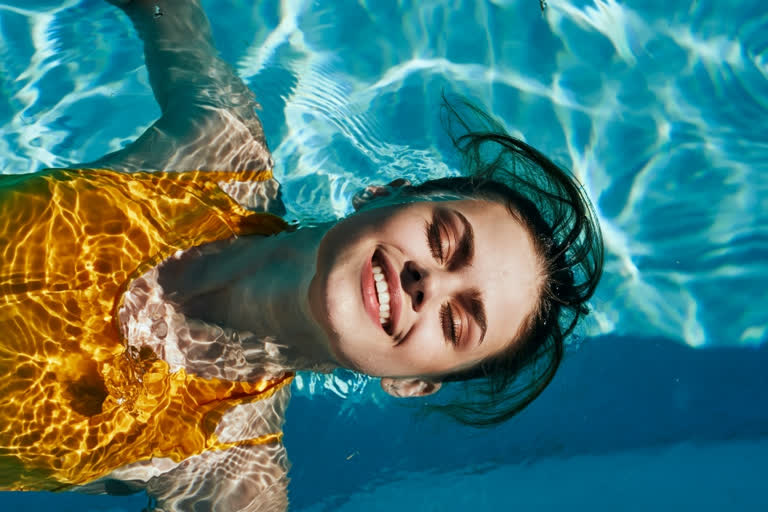In summers, apart from indulging in it as exercise, people enjoy swimming as they get relief from the hot weather, especially when the temperatures are soaring. Be it, children or adults, spending time in a swimming pool as well as in waterparks, is always fun. But did you know, that spending too much time in the water, can affect your hair and skin? Apparently, Chlorine is used in pools to keep the water clean and if hair and skin stay in contact with the chlorine water for a long time, it can be harmful.
Dr. Rita S. Arora, Dermatologist at Derma Care Mumbai, states that staying in chlorinated water for a long time can make the skin dry and cause rashes and allergies on the skin. Apart from this, there are chances of skin becoming more sensitive. Therefore, when swimming in the sun, the skin becomes more tanned, may have a burning sensation and itching as well as cracks may also develop. Alongside, hair may become weak and less lustrous.
What precautions can be taken?
Dr. Rita explains that certain precautions can be taken to protect the skin and hair from chlorine damage. The first and foremost is consuming a nutritious and balanced diet as well as drinking a lot of water throughout the day. She says that apart from a diet rich in vitamins, minerals and other nutrients, consume foods that have more water content, so that not just the body but both hair and skin do not lack natural moisture.
Staying in chlorinated water for too long can affect the skin’s complexion as well as its pH level, therefore, Dr. Rita says that if the body is properly hydrated and nourished, the effects of water on the body will be relatively less. Apart from this, here are some more tips to keep in mind:
Tips for skincare
- Everyone knows that sunscreen protects the skin from the sun's harmful rays, but it can also protect from the effects of chlorine water. Therefore, apply a waterproof sunscreen before stepping in a swimming pool or going to a water park.
- After returning from the water park or pool, take a bath with clean water. This will help in reducing the effect of chlorine on the skin. Also, if possible, use lukewarm water for bathing and apply a moisturizer after the bath.
- If you go swimming regularly, massaging your body with oil, once a week will be very beneficial. It helps in retaining the moisture in the skin and keeps it healthy.
- Since chlorinated water affects the pH level of the skin, combat it by increasing the intake of vitamin C in your food. You can also use skin care products containing vitamin C.
Tips for hair care
- Wear a swimming cap when stepping in chlorinated water. It will save your hair from coming in direct contact with the water.
- After coming out of the pool, wash your hair with clean water. This will help in removing chlorine in the hair to some extent. Also, avoid using shampoo immediately after getting out of the water.
- People who go swimming regularly should be extra cautious. Oil your hair at least once a week and go for hair spas at regular intervals.
- Since normal water cannot completely wash off the effect of chlorine in hair, wash your hair at least once a week with a clarifying shampoo.
- People begin to use more conditioner as their hair begins losing luster due to chlorine. But, in such a situation, using lemon juice as a conditioner is more beneficial than a hair conditioner. Therefore, after shampooing, take a mug of water and add lemon juice to it, then pour it over your hair. After 5 minutes, wash your hair with clean water.
- If possible, steam your hair after washing them. This will help open the pores on the scalp and make the hair stronger.
- Many specific products for swimmers are also available, such as shampoos and sprays, which help in removing chlorine from the hair. People who have their hair coloured may use a colour protectant shampoo.



